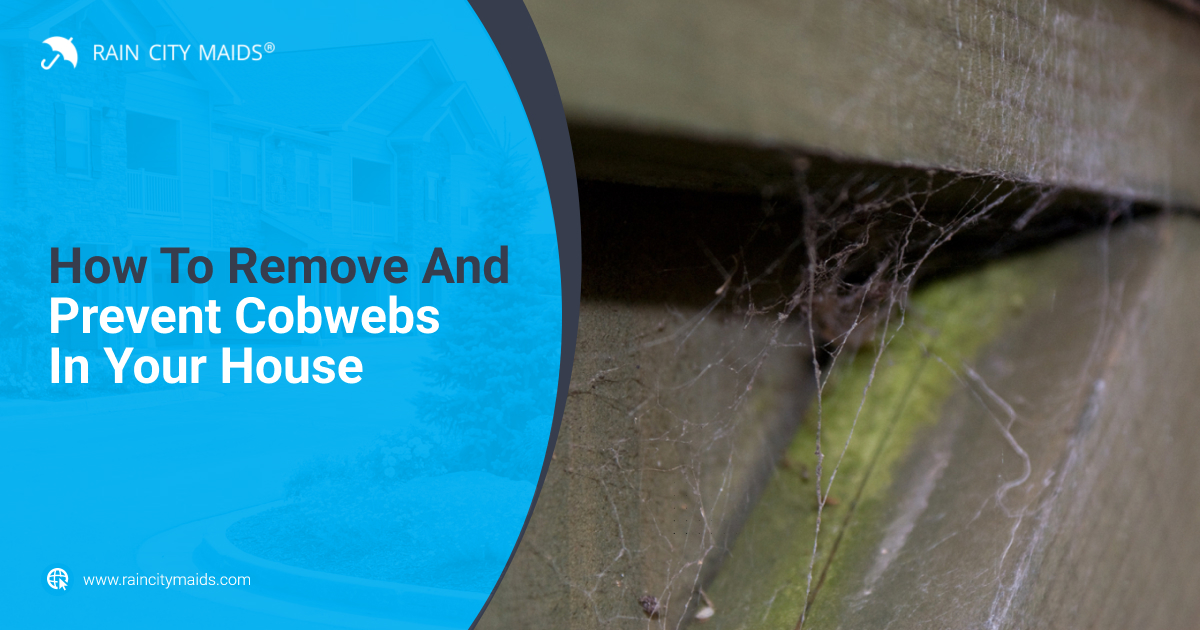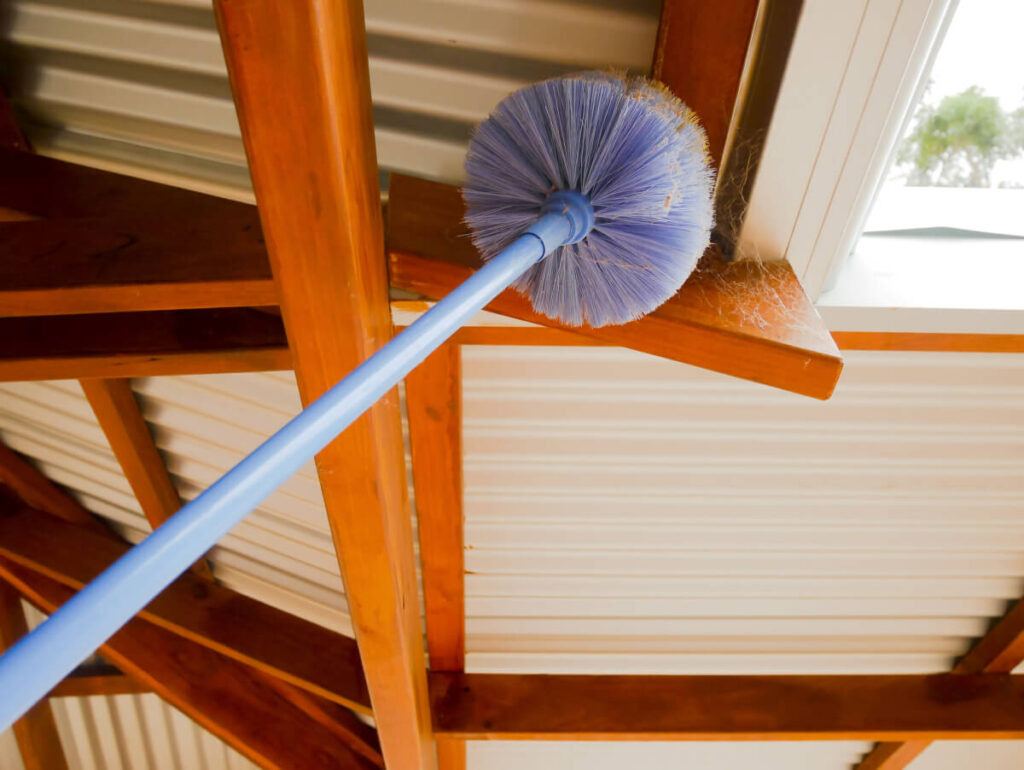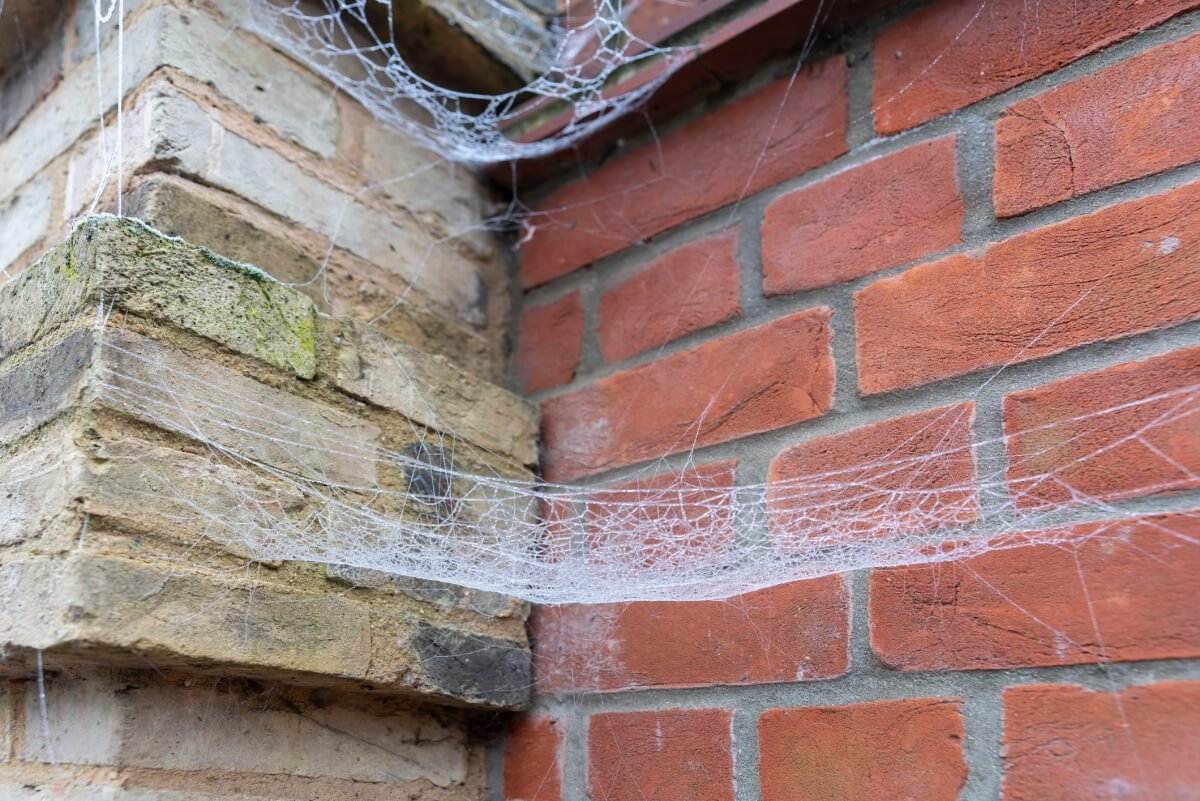To avoid spider webs in your house, keep it clean and reduce clutter. Use essential oils like peppermint as a natural deterrent.
Dealing with spider webs in your house can be a frustrating task. Spiders are attracted to quiet, undisturbed areas to spin their webs. Regular cleaning is your first line of defense against these eight-legged intruders. Wiping down surfaces, vacuuming regularly, and decluttering your space can significantly reduce the appeal of your home to spiders.
Essential oils, such as peppermint, lavender, or tea tree oil, can act as natural repellents. Applying these oils around windows, doors, and other entry points can help keep spiders at bay. Sealing cracks and openings is another effective strategy to prevent spiders from entering your home. By adopting these simple practices, you can maintain a spider-free environment and enjoy a cleaner, more inviting space.

Credit: www.raincitymaids.com
Introduction To Spider Webs
Spider webs are intricate structures built by spiders. They serve as homes, hunting grounds, and egg-laying sites. Understanding webs can help prevent them in houses.
The Biology Of Spider Web Creation
Spiders produce web silk from their spinnerets. Different spiders create unique webs. These webs can be orb-shaped, funnel-like, or messy cobwebs.
Why Spiders Choose Homes
Spiders enter homes seeking shelter and food. They prefer quiet, undisturbed areas. Common house spiders detect insect activity and set up webs accordingly.
Common Areas For Webs In Homes
Spiders often seek out quiet, undisturbed areas to build their webs. Knowing where these spots are can help you keep your home spider-free. Corners, ceilings, and less trafficked areas tend to be web-building favorites for our eight-legged friends. Let’s pinpoint these locations and discuss how to make them less inviting.
Identifying Spider Hotspots
Check these places regularly:
- Window frames
- Behind furniture
- Basement corners
- Garage and shed
These spots provide perfect cover and ample insect traffic for spiders.
Factors Attracting Spiders Indoors
Understanding what brings spiders into your home is key. Here’s a list:
- Warmth during colder months
- Food supply, like other insects
- Dark, undisturbed areas
Minimize these factors to make your home less appealing. Regular cleaning and maintenance is a must. Seal cracks and openings to block entry points. Use adequate lighting to deter insects, which spiders prey on.
Preventive Measures
Want to keep spider webs out of your house? Follow these steps.
Regular Cleaning Routines
Keeping your house clean is key. Dust and vacuum often. Pay attention to corners and hidden spots. Spiders love these areas.
- Vacuum regularly, especially under furniture and in corners.
- Dust shelves, blinds, and other surfaces to keep spiders away.
- Use a microfiber cloth. It grabs spider webs well.
Empty the vacuum outside. This makes sure spiders don’t come back in.
Essential Oils And Natural Repellents
Spiders dislike certain smells. Use these to your advantage.
| Essential Oil | How to Use |
|---|---|
| Peppermint | Mix with water. Spray around the house. |
| Lavender | Drop on windowsills and doorways. |
| Lemon | Wipe surfaces with lemon oil mixed in water. |
Tip: Refresh these repellents weekly. This keeps your home spider-free.

Credit: www.yalepest.com
Sealing Entry Points
Sealing entry points is a key step to prevent spider webs in your house. Spiders sneak in through small gaps and cracks. A house without gaps will have fewer spiders.
Inspecting For Gaps And Cracks
Start by looking around your home. Check windows, doors, and walls. Use a flashlight to see tiny cracks. Even small gaps can let spiders in.
- Check window frames and door edges closely.
- Look at where pipes and wires enter your home.
- Inspect the foundation for any cracks.
Weatherproofing Your Home
Weatherproofing blocks spiders from entering. It keeps your home safe and warm.
- Seal cracks with caulk. This closes the gaps.
- Install weather stripping on doors and windows. This stops drafts and spiders.
- Use door sweeps on all exterior doors. They block gaps under doors.
Remember, sealing your home is good for energy saving too. It keeps the cold out in winter and the heat out in summer. Fewer gaps mean fewer spiders and lower energy bills.
Maintaining A Clutter-free Environment
Keeping your house free from clutter is a key step in avoiding spider webs. Spiders love to hide and build their webs in undisturbed areas. By reducing clutter, you minimize these hiding spots. Organizing your space efficiently can deter spiders from taking up residence. Let’s explore some organizational tips and the benefits of minimalism in maintaining a spider-free environment.
Organizational Tips
- Sort items regularly to keep only what you need.
- Use storage solutions like shelves and boxes to keep things off the floor.
- Regularly dust and vacuum corners and hidden spots.
- Label storage containers to easily find items and avoid piling.
Benefits Of Minimalism
Minimalism is more than a design concept; it’s a way of living. By embracing a minimalist lifestyle, you not only create a more open and peaceful space but also make it less inviting for spiders. Here are a few benefits:
| Benefit | Description |
|---|---|
| Easier Cleaning | Less clutter means quicker and more efficient cleaning. |
| Less Stress | A decluttered space leads to a clear mind and reduced anxiety. |
| Spots Pests Quickly | With fewer hiding spots, you can identify and deal with pests promptly. |
Natural Predators And Biological Control
Spiders enter homes, often seeking shelter or prey. Yet, many natural predators can help control their population. Biological control involves these predators. It’s a safe, eco-friendly way to reduce spiders without chemicals. Let’s explore options to encourage these helpful allies.
Encouraging Beneficial Insects
Many insects feed on spiders. Ladybugs, lacewings, and even some types of wasps can be allies in controlling spider populations. Attract these beneficial insects by planting native flowers and herbs. They provide nectar and pollen, which are food sources for these insects.
- Ladybugs: These feed on spider mites, a common spider food source.
- Lacewings: Their larvae are known as “aphid lions” and can consume spider eggs.
- Parasitic wasps: Some species lay eggs inside spider eggs, stopping new spiders from hatching.
Pet-friendly Spider Control
Pets can be great spider deterrents. Cats often chase and play with spiders, while some dog breeds can sniff out and deter spiders. Choose pet-friendly spider control methods to keep both your pets and home safe.
| Pet Type | Method |
|---|---|
| Cats | Chase and catch spiders |
| Dogs | Sniff out and deter spiders |
Remember, not all pets have a prey drive. Some might ignore spiders. Always ensure any spider control measures are safe for your pets.
Chemical Repellents And Insecticides
Chemical repellents and insecticides are effective against spiders.
They block spiders from entering homes.
But, they must be used safely and correctly.
Safe Use Of Chemicals
- Read labels carefully.
- Wear protective gear: gloves, masks.
- Keep away from children and pets.
- Use in well-ventilated areas.
- Store securely after use.
Understanding Insecticide Efficacy
Not all chemicals work the same.
Choose the right type for spiders.
| Type | Effectiveness | Usage |
|---|---|---|
| Pyrethroids | High | Perimeters |
| Insect Growth Regulators | Moderate | Indoor spaces |
Check product reviews and studies.
Reapply as directed by the product.
Monitoring And Long-term Strategies
Monitoring and Long-Term Strategies play a crucial role in keeping your home free from spider webs. Regular inspections and preventive measures can significantly reduce the likelihood of these eight-legged guests taking up residence in your corners and crevices. Let’s dive into some effective tactics to maintain a spider-free space.
Regular Check-ups
Consistent home check-ups are your first line of defense against spiders. Look for signs of webs in hidden areas. These spots include basements, attics, and garages. Use a long-handled broom to sweep away any webs. Don’t forget to check behind furniture and appliances. Spiders love these quiet, undisturbed spaces.
- Inspect corners and ceiling junctions
- Clean behind large furniture regularly
- Seal cracks and crevices in walls and foundations
When To Call Pest Control
Sometimes, despite your best efforts, spiders might persist. If you notice an increase in webs or spiders, it’s time to call professionals. A qualified pest control service can identify the spider species. They provide tailored solutions for your home. Look for signs like frequent webs, spider sightings, and egg sacs. These signs suggest it’s time to seek expert help.
| Sign | Action |
|---|---|
| Frequent webs | Call pest control |
| Spider sightings | Seek expert assessment |
| Egg sacs | Request removal services |
Diy Spider Traps
To avoid spider webs in your house, create DIY spider traps using vinegar and water solution in spray bottles. Place these traps in corners and near entry points to deter spiders naturally. Regularly clean and declutter to prevent spiders from making webs indoors.
Creating Simple Traps ———————- To create a simple spider trap at home, place sticky traps in dark corners and behind furniture.Effectiveness and Safety Considerations —————————————– Ensure traps are out of reach of children and pets to maintain safety. Regularly check and replace traps for efficiency.Benefits of DIY Spider Traps: – Cost-effective – Eco-friendly – Safe for indoor useImportant Tips: 1. Place traps near windows and doors 2. Use non-toxic glue traps 3. Replace traps every 2-3 months| Pros | Cons |
|---|---|
| Easy to make | May not catch all spiders |
| Safe for indoor use | Need regular replacement |
:max_bytes(150000):strip_icc()/effective-tips-for-controlling-house-spiders-2656497-ADD-COLOR-477c952b5c9441a7a7f30a4bc67d1b32.png)
Credit: www.thespruce.com
Frequently Asked Questions
Why Do Spiders Come Inside Homes?
Spiders typically enter homes seeking shelter and food. They are drawn to warm, dark, cluttered spaces where they can find insects to eat.
What Are Natural Spider Repellents?
Natural spider repellents include peppermint oil, vinegar, and citrus. Apply these substances at entry points to deter spiders from entering.
How Often Should You Clean To Prevent Spiders?
Regular cleaning, at least once a week, can help prevent spiders. Focus on removing webs, decluttering, and vacuuming hidden corners.
Can Sealing Cracks Keep Spiders Out?
Yes, sealing cracks and gaps in your home’s exterior can prevent spiders from entering. Pay special attention to windows, doors, and foundation cracks.
Conclusion
Battling spider webs in your home doesn’t have to be a daily chore. Simple steps like regular cleaning, using essential oils, and sealing entry points can keep these pests at bay. Remember, a spider-free home is achievable with persistence and the right techniques.
Embrace these tips and enjoy a web-less living space!
Related posts:

I’m MD Tanvir, and I bring years of expertise gained from working closely with pest control companies to the forefront. My journey in the industry has inspired me to launch Bug Battler, a platform aimed at equipping people with the know-how to combat pests autonomously. Through Bug Battler, I aim to empower individuals with practical insights to tackle pest infestations effectively.

